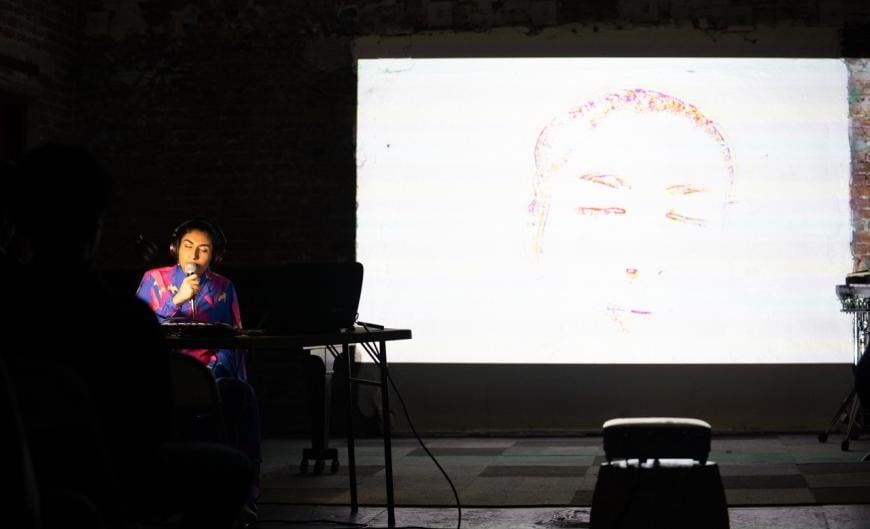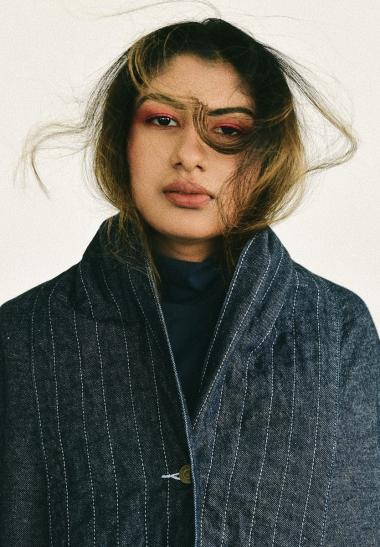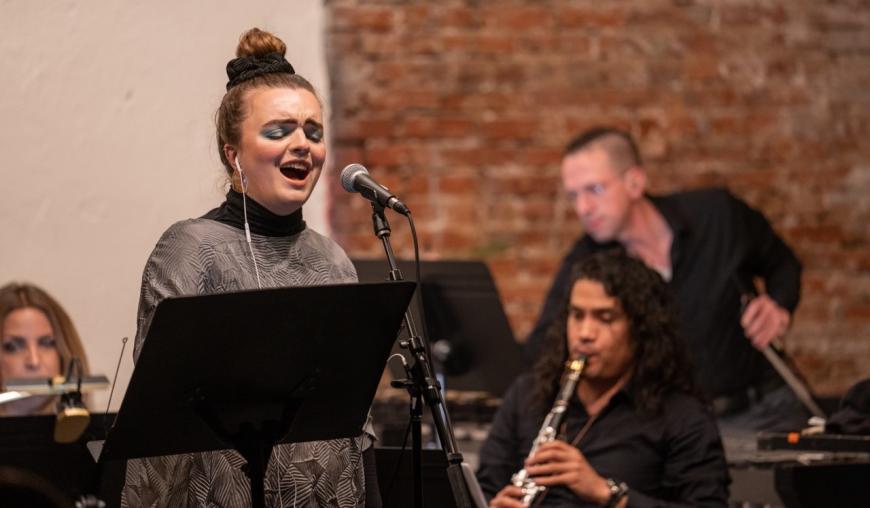
The beginnings of a family tree are growing out from certain giving, fostering musicians. It was a joy to see the fruits of that tree at Brightwork newmusic’s March 21 show, “Nina Shekhar and Friends.” Composer Nina Shekhar brought together the music of her friends Akshaya Tucker and Nicolás Lell Benavides in her first curated concert, which featured both the Brightwork Ensemble and the luscious Lyris Quartet.
Shekhar had returned briefly to her old stomping grounds in Los Angeles from her new home in Princeton, where she is pursuing her Ph.D., for events all tied together by ideas of community. For the past several years, she has mentored the young composers in Brightwork’s High School Composer Initiative. The new-music group threw her the reins to program this concert at Koreatown’s Monk Space as a thank-you for her work with the students and as a sort of carrot to lure her back out west, if just for a short time.

Shekhar was also commissioned by the LA Phil’s Youth Orchestra of Los Angeles program to write a flex score that would be playable by many different instrumental combinations. She came up with what she describes as a “Mad Libs score,” where the students create sounds themselves to fill in the blanks. In an interview the day before the concert at Monk Space, Shekhar talked about how she didn’t particularly care how the piece sounded but that she did want the kids to go through this process of creation and to have a silly, fun time doing it.
For someone who is actively opening up space for young students, and who was surrounded by friends during the concert, it was odd that much of Shekhar’s conversation turned to her struggle with isolation. This feeling in the past year of a lack of community has led her to question her involvement in concert music altogether and to turn to video production as an outlet.

“I was kind of struggling with figuring out what my musical community was and why I was making the work that I was making, and I just kind of wanted an escape from it,” she said. “I’m not really part of the visual art community. I don’t know what aesthetic trends there are or what different camps there are in the video community, so for me, it was just like, ‘Yay! Let’s just try stuff.’”
I know Shekhar as a friend, and it is always a delight to hear the levity with which she seasons everything she does, regardless of the weight of the topic or emotion at hand. She also just lets things be simple.
When I asked about programming Benavides’s string quartet El Correcaminos and Tucker’s Enough, to Unfold, she replied, “I guess when I chose these people for this programming, I kind of chose them because their music is really different from mine. But also, there are some similarities. Like with [my piece] Don’t Beat a Word, some of the ornamentation is slightly related to Hindustani music, and I felt like, ‘Oh, the piece of Akshaya’s is kind of similar in the way she ornaments things.’ And with Nick, actually, I wrote [my piece rockabye-bye] for him and [his wife] Maggie [Beidelman] when they had their son, Lalo. And in a way, I wanted to have him on the program with this piece that I wrote for him.”
But of course, her reasoning goes beyond simple personal concerns and into considerations of musical community and the intentional incorporation of identity into art. We spoke at length about her perceptions of the aesthetics of the “in” crowd in contemporary classical music and how she had frequently talked with these particular friends about feeling like their music fell outside of the requisite “edginess” to be truly in vogue. (Check out the trailer for her remix Turn Your Feet Around [2021, for Alarm Will Sound and the Mizzou International Composers Festival], which deconstructs Gloria Estefan’s cover of the song of almost the same name.)
Shekhar explained:
I definitely think [that] the supposedly ‘genre-bending’ thing — which is weird because that becomes its own genre and still has a foot in all these other genres, too — but this idea of supposedly challenging the classical aesthetic, or even, like, a pop aesthetic, I think is very ‘in’ right now. And even though a lot of my music nowadays is things like deconstructing Gloria Estefan, I would never actually describe my music as ‘breaking’ something, or I would never describe it as being confrontational. Because I think there’s a level of arrogance attached to [breaking and challenging aesthetics]. For me, I’m engaging with Gloria Estefan because I’m trying to understand my own identity better and how that intersects with Gloria Estefan, and it has nothing to do with me challenging [her], and it has nothing to do with me challenging classical music. It’s more just for me to understand who I am. And so I would say, this idea of ‘edginess’ is really about [saying], ‘I’m going to be the one who breaks all these traditions,’ or whatever, but to me, it just feels really colonial. Because in other cultures, it’s all about building things up.”

Anyone who has pursued art, at least here in the States, has been told that you have to know the rules in order to break them, with the implication that progress only comes from the act of breaking. Much of what is seen as ingenuity in the contemporary classical music realm has hinged on an idea of breaking tradition, of shaking some foundational tenet of the classical musical culture to either make contact with other musical cultures or to simply be some form of “free.” We’re starting to see more musicians, like Shekhar, reaching for greater freedom via growth and not forgetting that part of that work is bringing others with them.
Pulling back the lens, we see that Shekhar, Tucker, and Benavides are connected by two other composers known for their invaluable mentorship — Reena Esmail in Los Angeles and Gabriela Lena Frank in the Bay Area. Esmail, who has cited inspiration from Frank’s artistic and community works, formed a bridge between Shekhar and Tucker as both were mentored by her, and Shekhar and Benavides in turn have taken part in Frank’s Creative Academy of Music. This is where I see the tree. Knowing the generosity of these three artists as friends and makers, and knowing that they were lifted up by these two other artists, makes me excited to see where these branches will reach.




